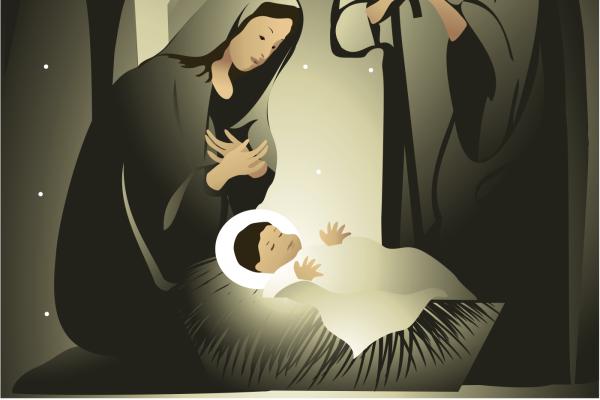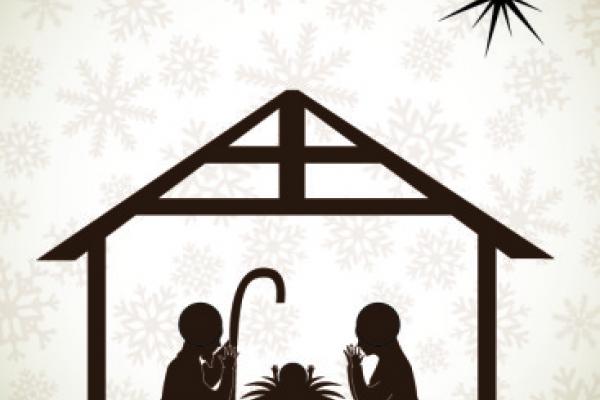The Metropolitan Museum of Art, on its website, has a wonderful slide show of paintings from the renaissance depicting the birth of Christ. This time of year those beautiful works of art often come to us through reproductions on Christmas cards. My husband and I support several charities that work in the emerging world so we also receive cards with nativity scenes reflecting cultures from across Africa and Latin American. Some of my favorite cards are the ones with nativity scenes from the Caribbean; I love their bright colors and exuberance.
Each of these cards, whatever the source, offers a different perspective on the birth of Christ; each presents a different emotion: serenity, joy, often the quiet peace associated with Christmas. What the artwork doesn’t convey, what our Christmas card may not fully be able to convey is the magnitude of Christ’s birth. Maybe the magnitude of this truly cataclysmic event is better depicted with words. And maybe there are no greater words then those of Mary.
The birth Christ ushers in peace through upheaval. It is a radical event. With the birth of Christ the world is turned upside down. Existing authority is challenged. Kings so terrified that their rage leads to mass killings. The significance of this night is not so gentle, not so calm. Not so much mentioned in our Christmas cards.
Editor's Note: New Vision Renewable Energy connects Christians with opportunities to provide renewable solar lights to people in the developing world. Their Christmas Lights Advent Devotional features daily readings and questions from prominent Christian thinkers, including Sojourners president Jim Wallis. This Day 10 of Advent devotional from Jim Wallis is reprinted and adapted with permission of New Vision Renewable Energy. You can find the full Christmas Lights Advent Devotional guide and solar light kits here: http://nvre.org/devotional-order.html
Proclaiming Jesus as light of the world is an audacious statement. It directly challenges all those idols that persistently attempt to replace God as the center of our lives and our world. In our culture, a selfishness that denies any obligation to anyone or anything beyond our own self-interest may be the greatest idol of all. It denies that demanding more and more energy at great cost to our environment and the people who live close to the land has problematic consequences. We have lost sight of the common good and the consequences have been devastating.
In many places, hope has turned into despair. Darkness seems to be crowding out light. From where will our help come from?
I’d say the moment is ripe for “Christ in Christmas” — the real Christ, of course, who shunned the privileged and aligned himself with sinners and outcasts, whose heart went out to sufferers like the homeless of Rome whom a new pope risks serving.
I’d say the moment is ripe for new life being born in stables and forced to flee the powerful and greedy. We have seen Mammon’s insatiable maw, power’s absolute corruption of the human soul, and thugs murdering the many in order to protect the few — and we know our need of something better.
So, yes, it’s time for Christ in Christmas. Time for new life, time for hope, time for the faithful to say yes to God. Time for peace, not war. Time for repentance, not comfort at any cost. Time for justice and mercy and the even-handed goodness that God promised.
This, of course, isn’t what zealots mean when they vow to “defend” the faith from a culture’s “war on Christmas.” They want a free-fire zone where moralizers can denounce all but the like-minded, and churches with huge budgets can frighten or seduce worshippers into donor mode. They mean using Jesus’ name to impose the very cultural and political oppression that Jesus escaped once as a child but couldn’t escape as an adult.
What makes one a good person? Additionally, what makes one a good Christian? I have been spending some time wondering about this as news of Mandela’s death has been making it’s way across the planet. Was he a good man? I think so, but how do we measure that? How do we know? And if, as some have claimed, his greatness stemmed from his willing embodiment of his Christian faith, I need to know if he was a good Christian.
Guy Sorman writes of Mandela:
“The Commission for Truth and Reconciliation, founded by President Mandela and led by Bishop Tutu, is perhaps the most concrete example of Mandela’s Christian faith. Instead of the vengeance and reprisals that were expected and feared after years of interracial violence, the commission focused on confession and forgiveness. Most of those who admitted misdeeds and even crimes — whether committed in the name of or in opposition to apartheid — received amnesty. Many returned to civil life, exonerated by their admission of guilt.”
Mandela is exemplary not because he was perfect, always kind to everyone he met, an ideal husband and father, but because of these larger virtues that he also attempted to live out. He lived into these virtues — all of them, large and small, and all of them incompletely.
While sitting listening to a musician pour out her heart through music at a show the intern house hosted, I was challenged. The emotions in her voice communicated her story and as I sat there pleasantly soaking in the music and admiring her vulnerability, I also realized I wouldn’t want to put myself out there like that. At that same moment, I stopped and thought, is that how I view church? Do I put up those same walls with God?
Vulnerability is difficult, when our culture thrives on individualism. Television shows, books, and movies tell us that we can create the world we desire through our own strength. This culture tells us that we are the creators of our reality, a societal standard that has seeped into the church, creating a standard of self-reliance and individualism.
Brennan Manning stated, “the church is not a museum for saints but a hospital for sinners.” The church “hospital” should be the place where we come ready for healing and treatment. As such, people generally do not go to a hospital hiding their wounds and disease expecting to get better. This self-medication can only cover the symptoms while never combating the true source of the ailment. The truth is that in life, we are all terminally ill patients with different pains in desperate need of a doctor. In this, we are not alone in the fight.
Way back in the day (circa 2004), Switchfoot's lead singer, Jon Foreman, was asked if the band is a “Christian” band. Even though it's been a while, his response is worth looking at again.
The American Family Association has been tracking major companies to see how they promote Christmas. It came up with the “Naughty or Nice” list where it has examined different company’s websites, circulars, commercials, and stores noting how many times they use the word “Christmas,” if at all. According to the association’s website, “If a company has items associated with Christmas, but did not use the word “Christmas,” then the company is considered as censoring “Christmas.” Its research has uncovered that if you shop at Radio Shack, Barnes & Noble, Family Dollar, and Foot Locker (just to name a few) then you are part of the problem and thus should be placed on the “naughty list.”
The American Family Association believes that there is a full out “war on Christmas.” Well, I would have to say that it is correct but not for the reasons it postulates.






